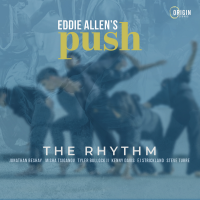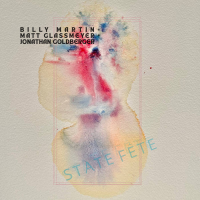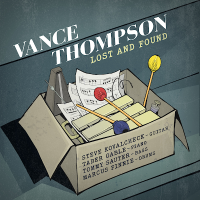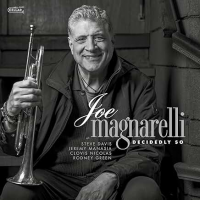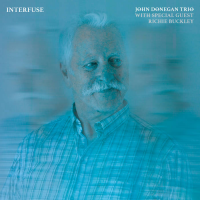Home » Jazz Articles » Album Review » Barry Wallenstein: Tony's Blues
Barry Wallenstein: Tony's Blues
Tony’s Blues matches the high standard Wallenstein established in his previous recordings with a set whose emotional range encompasses wit, whimsy, despair, thoughtful reflection and outrageous exuberance. About half of its twenty-four poems appeared in Wallenstein’s excellent poetry collection A Measure of Conduct , which includes a poem sequence about Tony, the urban hipster whose solitary pursuit of personal truths frames the recording. A quintet with an unconventional front line of trumpet and french horn enhances the poems with empathic textures that combine the fluidity of bop and the polyphony of early jazz with a splash of avant-garde spice. Wallenstein’s assured recitation focuses the musicians on the delicate interaction; his lines weave around theirs with deceptive ease. Acting in the moment, he departs from the text when a verbal substitution, like a harmonic substitution, strengthens the interplay of words and music. The result sounds as relaxed as a club date, a rare accomplishment in a studio environment. To enhance the textural variety and render the ambience more intimate, Wallenstein breaks the ensemble into smaller units featuring different instrumental combinations. In a bass-voice duet, Jay Leonhart’s vamping, sliding lines propel Wallenstein’s flight from “New York to London” until it lands in the existential city of the self. “Waking to the Dark” features Evan Hause’s haunting guitar and percussion effects welling around Wallenstein’s intense recitation. On “Ghosts,” Hause’s percussion rattles bones while pianist John Hicks prods Wallenstein’s impeccable delivery with a backbeat blues, then cuts to double tempo as the images of the dead quicken. Hause’s eerily resonating guitar bends Hicks’s chords into a surreal backdrop for “Devil Design,” an anti-heroin poem that packs in power everything that it lacks in polemics. Jay Leonhart and Hicks render “Hotel Splendide” a late-night ballad in which Tony’s despair stops one drink short of the lush life. Vincent Chancey’s questing french horn opens the three-poem “Tony’s Sequence,” in which Tony searches for a sense of himself, only to find his presence as illusory as his father’s authority as a slaughterhouse foreman. The sequence moves at a reflective pace, except for the off-kilter piano-bass pulse that signals the onset of Tony’s pot high. While Tony’s concerns are personal, Wallenstein’s extend into the social. A second duet with Jay Leonhardt, on background vocals as well as bass, sends up “Another Salesman” hyping the ocean in a spiel that laces the language of ecology with corporate greed. “In the Board Room” continues the commentary while Michael Leonhart trumpets loss and anger above the ominous jaunt of Hick’s vamp. The closing lines, “smiles, when they appear,/ seem stolen,” set the tone for the illusory authority that threads through “Tony’s Sequence.” But the difference between Tony’s personal and Wallenstein’s social concerns isn’t so clear-cut. In “Serving the State,” the marching arco bass, muttering french horn and clanging percussion underscore the narrator’s alienation as the “state” becomes a “state of mind.” Through juxtaposing Tony and himself as narrators, Wallenstein links the personal to the political. The full ensemble performs on “ Dr. Trope” and “Rabbits on Castle Grounds.” The horns lay back on “Dr. Trope” while the rhythm section’s loping waltz propels Wallenstein through a gallows humor account of surgery. “Rabbits” features the exuberant romp of Vincent Chancey and Michael Leonhart over a march vamp that transforms the villanelle’s repetitive lines into a manic hunt. Wallenstein and his band work so well together on this eminently likeable recording that only additional solo space could have enhanced it. The one sustained solo, on “Leisure Time Out,” features Michael Leonhart’s exceptional plunger work. Chancey plays eight inventive measures on “Blues.” Solos between stanzas of several poems would have strengthened the sense of spontaneity that characterizes Tony’s Blues. This minor criticism aside, Tony’s Blues presents fresh jazz poetry from one of the idiom’s masters. In case you’ve missed his previous work, Tony’s Blues is an excellent introduction to Wallenstein’s savvy fusion of two difficult but compatible idioms.
Track Listing
Little Bestiary; New York to London; Fancy Takes Me Home; Hotel Splendide; Blues; Another Salesman; In The Boardroom; Tony
Personnel
Barry Wallenstein, poetry, recitation; Vincent Chancey, french horn; Michael Leonhart, trumpet; John Hicks, piano; Jay Leonhart, bass, vocals; Evan Hause, percussion, guitar
Album information
Title: Tony's Blues | Year Released: 2001 | Record Label: Cadence Jazz Records
Tags
PREVIOUS / NEXT
Support All About Jazz
 All About Jazz has been a pillar of jazz since 1995, championing it as an art form and, more importantly, supporting the musicians who make it. Our enduring commitment has made "AAJ" one of the most culturally important websites of its kind, read by hundreds of thousands of fans, musicians and industry figures every month.
All About Jazz has been a pillar of jazz since 1995, championing it as an art form and, more importantly, supporting the musicians who make it. Our enduring commitment has made "AAJ" one of the most culturally important websites of its kind, read by hundreds of thousands of fans, musicians and industry figures every month.









